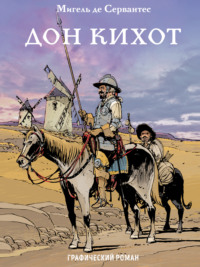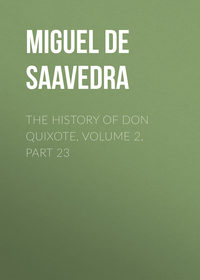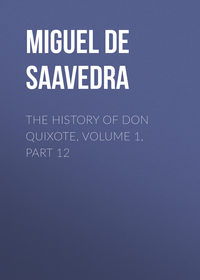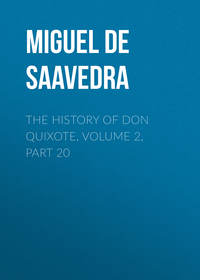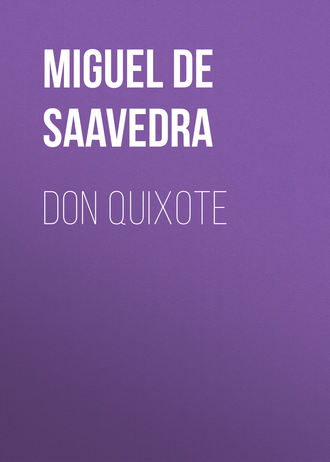 полная версия
полная версияDon Quixote
At the cries and moans of Sancho, Don Quixote came to himself, and the first word he said was, "He who lives separated from you, sweetest Dulcinea, has greater miseries to endure than these. Aid me, friend Sancho, to mount the enchanted cart, for I am not in a condition to press the saddle of Rocinante, as this shoulder is all knocked to pieces."
"That I will do with all my heart, senor," said Sancho; "and let us return to our village with these gentlemen, who seek your good, and there we will prepare for making another sally, which may turn out more profitable and creditable to us."
"Thou art right, Sancho," returned Don Quixote; "It will be wise to let the malign influence of the stars which now prevails pass off."
The canon, the curate, and the barber told him he would act very wisely in doing as he said; and so, highly amused at Sancho Panza's simplicities, they placed Don Quixote in the cart as before. The procession once more formed itself in order and proceeded on its road; the goatherd took his leave of the party; the officers of the Brotherhood declined to go any farther, and the curate paid them what was due to them; the canon begged the curate to let him know how Don Quixote did, whether he was cured of his madness or still suffered from it, and then begged leave to continue his journey; in short, they all separated and went their ways, leaving to themselves the curate and the barber, Don Quixote, Sancho Panza, and the good Rocinante, who regarded everything with as great resignation as his master. The carter yoked his oxen and made Don Quixote comfortable on a truss of hay, and at his usual deliberate pace took the road the curate directed, and at the end of six days they reached Don Quixote's village, and entered it about the middle of the day, which it so happened was a Sunday, and the people were all in the plaza, through which Don Quixote's cart passed. They all flocked to see what was in the cart, and when they recognised their townsman they were filled with amazement, and a boy ran off to bring the news to his housekeeper and his niece that their master and uncle had come back all lean and yellow and stretched on a truss of hay on an ox-cart. It was piteous to hear the cries the two good ladies raised, how they beat their breasts and poured out fresh maledictions on those accursed books of chivalry; all which was renewed when they saw Don Quixote coming in at the gate.
At the news of Don Quixote's arrival Sancho Panza's wife came running, for she by this time knew that her husband had gone away with him as his squire, and on seeing Sancho, the first thing she asked him was if the ass was well. Sancho replied that he was, better than his master was.
"Thanks be to God," said she, "for being so good to me; but now tell me, my friend, what have you made by your squirings? What gown have you brought me back? What shoes for your children?"
"I bring nothing of that sort, wife," said Sancho; "though I bring other things of more consequence and value."
"I am very glad of that," returned his wife; "show me these things of more value and consequence, my friend; for I want to see them to cheer my heart that has been so sad and heavy all these ages that you have been away."
"I will show them to you at home, wife," said Sancho; "be content for the present; for if it please God that we should again go on our travels in search of adventures, you will soon see me a count, or governor of an island, and that not one of those everyday ones, but the best that is to be had."
"Heaven grant it, husband," said she, "for indeed we have need of it. But tell me, what's this about islands, for I don't understand it?"
"Honey is not for the mouth of the ass," returned Sancho; "all in good time thou shalt see, wife – nay, thou wilt be surprised to hear thyself called 'your ladyship' by all thy vassals."
"What are you talking about, Sancho, with your ladyships, islands, and vassals?" returned Teresa Panza – for so Sancho's wife was called, though they were not relations, for in La Mancha it is customary for wives to take their husbands' surnames.
"Don't be in such a hurry to know all this, Teresa," said Sancho; "it is enough that I am telling you the truth, so shut your mouth. But I may tell you this much by the way, that there is nothing in the world more delightful than to be a person of consideration, squire to a knight-errant, and a seeker of adventures. To be sure most of those one finds do not end as pleasantly as one could wish, for out of a hundred, ninety-nine will turn out cross and contrary. I know it by experience, for out of some I came blanketed, and out of others belaboured. Still, for all that, it is a fine thing to be on the look-out for what may happen, crossing mountains, searching woods, climbing rocks, visiting castles, putting up at inns, all at free quarters, and devil take the maravedi to pay."
While this conversation passed between Sancho Panza and his wife, Don Quixote's housekeeper and niece took him in and undressed him and laid him in his old bed. He eyed them askance, and could not make out where he was. The curate charged his niece to be very careful to make her uncle comfortable and to keep a watch over him lest he should make his escape from them again, telling her what they had been obliged to do to bring him home. On this the pair once more lifted up their voices and renewed their maledictions upon the books of chivalry, and implored heaven to plunge the authors of such lies and nonsense into the midst of the bottomless pit. They were, in short, kept in anxiety and dread lest their uncle and master should give them the slip the moment he found himself somewhat better, and as they feared so it fell out.
But the author of this history, though he has devoted research and industry to the discovery of the deeds achieved by Don Quixote in his third sally, has been unable to obtain any information respecting them, at any rate derived from authentic documents; tradition has merely preserved in the memory of La Mancha the fact that Don Quixote, the third time he sallied forth from his home, betook himself to Saragossa, where he was present at some famous jousts which came off in that city, and that he had adventures there worthy of his valour and high intelligence. Of his end and death he could learn no particulars, nor would he have ascertained it or known of it, if good fortune had not produced an old physician for him who had in his possession a leaden box, which, according to his account, had been discovered among the crumbling foundations of an ancient hermitage that was being rebuilt; in which box were found certain parchment manuscripts in Gothic character, but in Castilian verse, containing many of his achievements, and setting forth the beauty of Dulcinea, the form of Rocinante, the fidelity of Sancho Panza, and the burial of Don Quixote himself, together with sundry epitaphs and eulogies on his life and character; but all that could be read and deciphered were those which the trustworthy author of this new and unparalleled history here presents. And the said author asks of those that shall read it nothing in return for the vast toil which it has cost him in examining and searching the Manchegan archives in order to bring it to light, save that they give him the same credit that people of sense give to the books of chivalry that pervade the world and are so popular; for with this he will consider himself amply paid and fully satisfied, and will be encouraged to seek out and produce other histories, if not as truthful, at least equal in invention and not less entertaining. The first words written on the parchment found in the leaden box were these:
THE ACADEMICIANS OF ARGAMASILLA, A VILLAGE OF LA MANCHA, ON THE LIFE AND DEATH OF DON QUIXOTE OF LA MANCHA, HOC SCRIPSERUNT MONICONGO, ACADEMICIAN OF ARGAMASILLA,
ON THE TOMB OF DON QUIXOTE EPITAPHThe scatterbrain that gave La Mancha more Rich spoils than Jason's; who a point so keen Had to his wit, and happier far had beenIf his wit's weathercock a blunter bore;The arm renowned far as Gaeta's shore, Cathay, and all the lands that lie between; The muse discreet and terrible in mienAs ever wrote on brass in days of yore;He who surpassed the Amadises all, And who as naught the Galaors accounted, Supported by his love and gallantry:Who made the Belianises sing small, And sought renown on Rocinante mounted; Here, underneath this cold stone, doth he lie.PANIAGUADO, ACADEMICIAN OF ARGAMASILLA, IN LAUDEM DULCINEAE DEL TOBOSO
SONNETShe, whose full features may be here descried, High-bosomed, with a bearing of disdain, Is Dulcinea, she for whom in vainThe great Don Quixote of La Mancha sighed.For her, Toboso's queen, from side to side He traversed the grim sierra, the champaign Of Aranjuez, and Montiel's famous plain:On Rocinante oft a weary ride.Malignant planets, cruel destiny, Pursued them both, the fair Manchegan dame,And the unconquered star of chivalry. Nor youth nor beauty saved her from the claimOf death; he paid love's bitter penalty, And left the marble to preserve his name.CAPRICHOSO, A MOST ACUTE ACADEMICIAN OF ARGAMASILLA, IN PRAISE OF ROCINANTE, STEED OF DON QUIXOTE OF LA MANCHA
SONNETOn that proud throne of diamantine sheen, Which the blood-reeking feet of Mars degrade,The mad Manchegan's banner now hath been By him in all its bravery displayed. There hath he hung his arms and trenchant bladeWherewith, achieving deeds till now unseen, He slays, lays low, cleaves, hews; but art hath madeA novel style for our new paladin.If Amadis be the proud boast of Gaul, If by his progeny the fame of Greece Through all the regions of the earth be spread,Great Quixote crowned in grim Bellona's hall To-day exalts La Mancha over these, And above Greece or Gaul she holds her head.Nor ends his glory here, for his good steedDoth Brillador and Bayard far exceed;As mettled steeds compared with Rocinante,The reputation they have won is scanty.BURLADOR, ACADEMICIAN OF ARGAMASILLA, ON SANCHO PANZASONNETThe worthy Sancho Panza here you see; A great soul once was in that body small, Nor was there squire upon this earthly ballSo plain and simple, or of guile so free.Within an ace of being Count was he, And would have been but for the spite and gall Of this vile age, mean and illiberal,That cannot even let a donkey be.For mounted on an ass (excuse the word), By Rocinante's side this gentle squire Was wont his wandering master to attend.Delusive hopes that lure the common herd With promises of ease, the heart's desire, In shadows, dreams, and smoke ye always end.CACHIDIABLO, ACADEMICIAN OF ARGAMASILLA, ON THE TOMB OF DON QUIXOTE EPITAPH
The knight lies here below, Ill-errant and bruised sore, Whom Rocinante boreIn his wanderings to and fro.By the side of the knight is laid Stolid man Sancho too, Than whom a squire more trueWas not in the esquire trade.TIQUITOC, ACADEMICIAN OF ARGAMASILLA, ON THE TOMB OF DULCINEA DEL TOBOSOEPITAPHHere Dulcinea lies. Plump was she and robust: Now she is ashes and dust:The end of all flesh that dies.A lady of high degree, With the port of a lofty dame, And the great Don Quixote's flame,And the pride of her village was she.These were all the verses that could be deciphered; the rest, the writing being worm-eaten, were handed over to one of the Academicians to make out their meaning conjecturally. We have been informed that at the cost of many sleepless nights and much toil he has succeeded, and that he means to publish them in hopes of Don Quixote's third sally.
"Forse altro cantera con miglior plectro."
END OF PART IDEDICATION OF PART II
TO THE COUNT OF LEMOS:These days past, when sending Your Excellency my plays, that had appeared in print before being shown on the stage, I said, if I remember well, that Don Quixote was putting on his spurs to go and render homage to Your Excellency. Now I say that "with his spurs, he is on his way." Should he reach destination methinks I shall have rendered some service to Your Excellency, as from many parts I am urged to send him off, so as to dispel the loathing and disgust caused by another Don Quixote who, under the name of Second Part, has run masquerading through the whole world. And he who has shown the greatest longing for him has been the great Emperor of China, who wrote me a letter in Chinese a month ago and sent it by a special courier. He asked me, or to be truthful, he begged me to send him Don Quixote, for he intended to found a college where the Spanish tongue would be taught, and it was his wish that the book to be read should be the History of Don Quixote. He also added that I should go and be the rector of this college. I asked the bearer if His Majesty had afforded a sum in aid of my travel expenses. He answered, "No, not even in thought."
"Then, brother," I replied, "you can return to your China, post haste or at whatever haste you are bound to go, as I am not fit for so long a travel and, besides being ill, I am very much without money, while Emperor for Emperor and Monarch for Monarch, I have at Naples the great Count of Lemos, who, without so many petty titles of colleges and rectorships, sustains me, protects me and does me more favour than I can wish for."
Thus I gave him his leave and I beg mine from you, offering Your Excellency the "Trabajos de Persiles y Sigismunda," a book I shall finish within four months, Deo volente, and which will be either the worst or the best that has been composed in our language, I mean of those intended for entertainment; at which I repent of having called it the worst, for, in the opinion of friends, it is bound to attain the summit of possible quality. May Your Excellency return in such health that is wished you; Persiles will be ready to kiss your hand and I your feet, being as I am, Your Excellency's most humble servant.
From Madrid, this last day of October of the year one thousand six hundred and fifteen.
At the service of Your Excellency:
MIGUEL DE CERVANTES SAAVEDRA
VOLUME II
THE AUTHOR'S PREFACE
God bless me, gentle (or it may be plebeian) reader, how eagerly must thou be looking forward to this preface, expecting to find there retaliation, scolding, and abuse against the author of the second Don Quixote – I mean him who was, they say, begotten at Tordesillas and born at Tarragona! Well then, the truth is, I am not going to give thee that satisfaction; for, though injuries stir up anger in humbler breasts, in mine the rule must admit of an exception. Thou wouldst have me call him ass, fool, and malapert, but I have no such intention; let his offence be his punishment, with his bread let him eat it, and there's an end of it. What I cannot help taking amiss is that he charges me with being old and one-handed, as if it had been in my power to keep time from passing over me, or as if the loss of my hand had been brought about in some tavern, and not on the grandest occasion the past or present has seen, or the future can hope to see. If my wounds have no beauty to the beholder's eye, they are, at least, honourable in the estimation of those who know where they were received; for the soldier shows to greater advantage dead in battle than alive in flight; and so strongly is this my feeling, that if now it were proposed to perform an impossibility for me, I would rather have had my share in that mighty action, than be free from my wounds this minute without having been present at it. Those the soldier shows on his face and breast are stars that direct others to the heaven of honour and ambition of merited praise; and moreover it is to be observed that it is not with grey hairs that one writes, but with the understanding, and that commonly improves with years. I take it amiss, too, that he calls me envious, and explains to me, as if I were ignorant, what envy is; for really and truly, of the two kinds there are, I only know that which is holy, noble, and high-minded; and if that be so, as it is, I am not likely to attack a priest, above all if, in addition, he holds the rank of familiar of the Holy Office. And if he said what he did on account of him on whose behalf it seems he spoke, he is entirely mistaken; for I worship the genius of that person, and admire his works and his unceasing and strenuous industry. After all, I am grateful to this gentleman, the author, for saying that my novels are more satirical than exemplary, but that they are good; for they could not be that unless there was a little of everything in them.
I suspect thou wilt say that I am taking a very humble line, and keeping myself too much within the bounds of my moderation, from a feeling that additional suffering should not be inflicted upon a sufferer, and that what this gentleman has to endure must doubtless be very great, as he does not dare to come out into the open field and broad daylight, but hides his name and disguises his country as if he had been guilty of some lese majesty. If perchance thou shouldst come to know him, tell him from me that I do not hold myself aggrieved; for I know well what the temptations of the devil are, and that one of the greatest is putting it into a man's head that he can write and print a book by which he will get as much fame as money, and as much money as fame; and to prove it I will beg of you, in your own sprightly, pleasant way, to tell him this story.
There was a madman in Seville who took to one of the drollest absurdities and vagaries that ever madman in the world gave way to. It was this: he made a tube of reed sharp at one end, and catching a dog in the street, or wherever it might be, he with his foot held one of its legs fast, and with his hand lifted up the other, and as best he could fixed the tube where, by blowing, he made the dog as round as a ball; then holding it in this position, he gave it a couple of slaps on the belly, and let it go, saying to the bystanders (and there were always plenty of them): "Do your worships think, now, that it is an easy thing to blow up a dog?" – Does your worship think now, that it is an easy thing to write a book?
And if this story does not suit him, you may, dear reader, tell him this one, which is likewise of a madman and a dog.
In Cordova there was another madman, whose way it was to carry a piece of marble slab or a stone, not of the lightest, on his head, and when he came upon any unwary dog he used to draw close to him and let the weight fall right on top of him; on which the dog in a rage, barking and howling, would run three streets without stopping. It so happened, however, that one of the dogs he discharged his load upon was a cap-maker's dog, of which his master was very fond. The stone came down hitting it on the head, the dog raised a yell at the blow, the master saw the affair and was wroth, and snatching up a measuring-yard rushed out at the madman and did not leave a sound bone in his body, and at every stroke he gave him he said, "You dog, you thief! my lurcher! Don't you see, you brute, that my dog is a lurcher?" and so, repeating the word "lurcher" again and again, he sent the madman away beaten to a jelly. The madman took the lesson to heart, and vanished, and for more than a month never once showed himself in public; but after that he came out again with his old trick and a heavier load than ever. He came up to where there was a dog, and examining it very carefully without venturing to let the stone fall, he said: "This is a lurcher; ware!" In short, all the dogs he came across, be they mastiffs or terriers, he said were lurchers; and he discharged no more stones. Maybe it will be the same with this historian; that he will not venture another time to discharge the weight of his wit in books, which, being bad, are harder than stones. Tell him, too, that I do not care a farthing for the threat he holds out to me of depriving me of my profit by means of his book; for, to borrow from the famous interlude of "The Perendenga," I say in answer to him, "Long life to my lord the Veintiquatro, and Christ be with us all." Long life to the great Conde de Lemos, whose Christian charity and well-known generosity support me against all the strokes of my curst fortune; and long life to the supreme benevolence of His Eminence of Toledo, Don Bernardo de Sandoval y Rojas; and what matter if there be no printing-presses in the world, or if they print more books against me than there are letters in the verses of Mingo Revulgo! These two princes, unsought by any adulation or flattery of mine, of their own goodness alone, have taken it upon them to show me kindness and protect me, and in this I consider myself happier and richer than if Fortune had raised me to her greatest height in the ordinary way. The poor man may retain honour, but not the vicious; poverty may cast a cloud over nobility, but cannot hide it altogether; and as virtue of itself sheds a certain light, even though it be through the straits and chinks of penury, it wins the esteem of lofty and noble spirits, and in consequence their protection. Thou needst say no more to him, nor will I say anything more to thee, save to tell thee to bear in mind that this Second Part of "Don Quixote" which I offer thee is cut by the same craftsman and from the same cloth as the First, and that in it I present thee Don Quixote continued, and at length dead and buried, so that no one may dare to bring forward any further evidence against him, for that already produced is sufficient; and suffice it, too, that some reputable person should have given an account of all these shrewd lunacies of his without going into the matter again; for abundance, even of good things, prevents them from being valued; and scarcity, even in the case of what is bad, confers a certain value. I was forgetting to tell thee that thou mayest expect the "Persiles," which I am now finishing, and also the Second Part of "Galatea."
CHAPTER I.
OF THE INTERVIEW THE CURATE AND THE BARBER HAD WITH DON QUIXOTE ABOUT HIS MALADY
Cide Hamete Benengeli, in the Second Part of this history, and third sally of Don Quixote, says that the curate and the barber remained nearly a month without seeing him, lest they should recall or bring back to his recollection what had taken place. They did not, however, omit to visit his niece and housekeeper, and charge them to be careful to treat him with attention, and give him comforting things to eat, and such as were good for the heart and the brain, whence, it was plain to see, all his misfortune proceeded. The niece and housekeeper replied that they did so, and meant to do so with all possible care and assiduity, for they could perceive that their master was now and then beginning to show signs of being in his right mind. This gave great satisfaction to the curate and the barber, for they concluded they had taken the right course in carrying him off enchanted on the ox-cart, as has been described in the First Part of this great as well as accurate history, in the last chapter thereof. So they resolved to pay him a visit and test the improvement in his condition, although they thought it almost impossible that there could be any; and they agreed not to touch upon any point connected with knight-errantry so as not to run the risk of reopening wounds which were still so tender.
They came to see him consequently, and found him sitting up in bed in a green baize waistcoat and a red Toledo cap, and so withered and dried up that he looked as if he had been turned into a mummy. They were very cordially received by him; they asked him after his health, and he talked to them about himself very naturally and in very well-chosen language. In the course of their conversation they fell to discussing what they call State-craft and systems of government, correcting this abuse and condemning that, reforming one practice and abolishing another, each of the three setting up for a new legislator, a modern Lycurgus, or a brand-new Solon; and so completely did they remodel the State, that they seemed to have thrust it into a furnace and taken out something quite different from what they had put in; and on all the subjects they dealt with, Don Quixote spoke with such good sense that the pair of examiners were fully convinced that he was quite recovered and in his full senses.
The niece and housekeeper were present at the conversation and could not find words enough to express their thanks to God at seeing their master so clear in his mind; the curate, however, changing his original plan, which was to avoid touching upon matters of chivalry, resolved to test Don Quixote's recovery thoroughly, and see whether it were genuine or not; and so, from one subject to another, he came at last to talk of the news that had come from the capital, and, among other things, he said it was considered certain that the Turk was coming down with a powerful fleet, and that no one knew what his purpose was, or when the great storm would burst; and that all Christendom was in apprehension of this, which almost every year calls us to arms, and that his Majesty had made provision for the security of the coasts of Naples and Sicily and the island of Malta.


